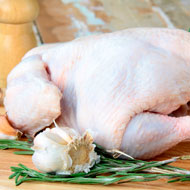Campylobacter levels continue to fall

“It is good to see that levels continue to go down as this indicates that the major retailers and processors are getting to grips with campylobacter."
Campylobacter levels in shop-bought chickens are continuing to decline, according to the latest survey by the Food Standards Agency (FSA), which found that less than half of those sampled tested positive.
FSA tested 1,051 whole fresh chickens that were produced in the UK, between January and March 2017. The number of chicken skin samples testing positive for campylobacter at any level fell to 48.8 per cent, from 50 per cent in the same period last year.
Across the market, an average of 6.5 per cent of chickens tested positive for the highest level of contamination, which is down from 9.3 per cent.
Among nine major named retailers, the figure for high-level campylobacter prevalence was five per cent, compared to 7.8 per cent last year. However, a group of smaller sampled retailers and butchers were found to have significantly higher levels (16.9 per cent) compared to the market average.
FSA chairman Heather Hancock commented: “It is good to see that levels continue to go down as this indicates that the major retailers and processors are getting to grips with campylobacter.
“These results give us a clear picture of the positive direction in which we are heading, and help us measure the impact of interventions that are being used to reduce contamination. While results are reassuring, we want to see more progress among the smaller businesses, to achieve real and lasting reductions.”
Campylobacter levels in shop-bought chickens have fallen consistently since the FSA began testing in 2014. Improvements in the level of contamination are reflected in declining numbers of people falling ill with campylobacter. It is estimated there were 100,000 fewer cases of campylobacter last year, leading to direct savings to the economy of more than £13 million, in terms of fewer days of work and NHS costs.



 The BSAVA has opened submissions for the BSAVA Clinical Research Abstracts 2026.
The BSAVA has opened submissions for the BSAVA Clinical Research Abstracts 2026.